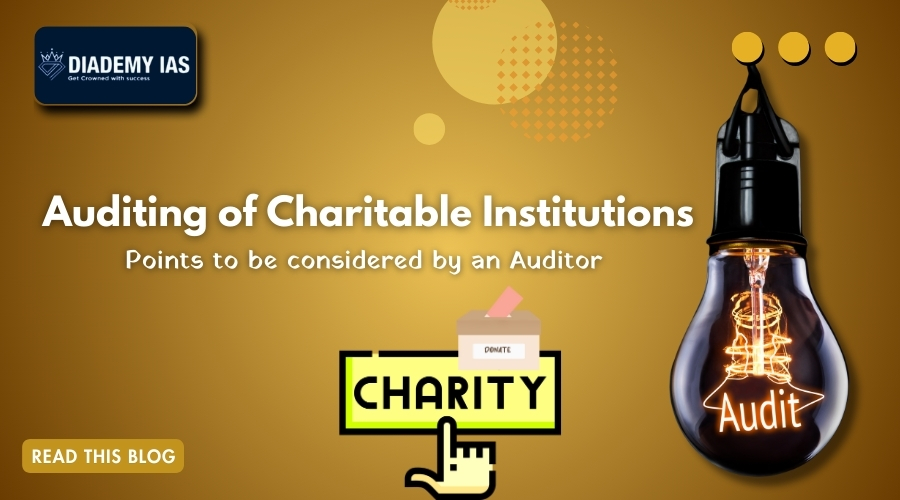Auditing Charitable Institutions
Discover the key points that auditors need to consider when conducting audits for charitable institutions. Diademy IAS informative guide provides valuable insights to ensure a thorough and successful audit process.

Table of Contents
- Verification of Legal Status
- Examination of Governing Documents
- Assessment of Internal Controls
- Verification of Donations and Grants
- Analysis of Fund Utilization
- Compliance with Tax Laws and Regulatory Frameworks
- Examination of Investments and Asset Management
- Review of Financial Statements
- Conducting Bank Reconciliation
- Compliance with Statutory and Regulatory Requirements
- Conclusion
Charitable institutions play a crucial role in social welfare by supporting causes such as education, healthcare, and poverty alleviation. However, ensuring transparency, accountability, and compliance with financial and legal regulations is imperative. The audit of charitable institutions is a significant topic in the UPSC Commerce and Accountancy Optional Paper.
For UPSC aspirants opting for Commerce and Accountancy as their optional subject, understanding the audit process for charitable institutions is essential. This topic is not only relevant for the exam but also holds practical significance in ensuring financial transparency and accountability in the non-profit sector. Charitable institutions, which operate for social welfare rather than profit, rely on public donations, grants, and government aid.
In this blog, we will explore the key points an auditor must consider while auditing charitable organizations, covering aspects like legal verification, fund utilization, tax compliance, internal controls, and financial statement audits. A structured understanding of this topic will not only help UPSC aspirants answer exam questions effectively but also enhance their grasp of real-world auditing practices in the non-profit sector.
Also Read - Interim Dividends and Duties of an Auditor
Prepare for UPSC 2025
With Commerce and Accountancy as Optional Subject. Join Diademy IAS
1. Verification of Legal Status
Before commencing the audit, an auditor must ascertain the legal status of the institution. This involves verifying registration under relevant laws, such as:
- The Societies Registration Act, 1860 (for societies)
- The Indian Trusts Act, 1882 (for charitable trusts)
- Section 8 of the Companies Act, 2013 (for non-profit companies) Ensuring proper registration is essential to confirm the institution’s legal existence and eligibility for tax exemptions under the Income Tax Act, 1961.
2. Examination of Governing Documents
Charitable institutions are governed by legal documents such as the trust deed, memorandum of association, and bylaws. Auditors must review these documents to understand:
- The objectives and operational framework of the institution
- The powers and responsibilities of trustees or managing committees
- Compliance with statutory provisions
3. Assessment of Internal Controls
A robust internal control system minimizes the risk of fraud and financial mismanagement. Auditors should examine:
- Controls over cash receipts and payments to ensure proper authorization
- Procurement policies and expenditure approvals
- Record-keeping systems for donations, expenses, and assets
- Segregation of duties to prevent financial misconduct
4. Verification of Donations and Grants
Donations and grants form the primary source of revenue for charitable institutions. Auditors should:
- Verify the authenticity of donation receipts
- Ensure compliance with donor-imposed restrictions (e.g., funds allocated for specific projects)
- Check compliance with Foreign Contribution (Regulation) Act (FCRA), 2010 for foreign contributions
- Examine whether donations eligible for 80G exemption under the Income Tax Act are properly accounted for
5. Analysis of Fund Utilization
Auditors must verify that funds are utilized strictly for charitable purposes and not diverted for unauthorized activities. This involves:
- Matching expenses with the organization's stated objectives
- Checking administrative and fundraising expenses to ensure they do not exceed prescribed limits
- Reviewing the justification and approval process for major expenses
6. Compliance with Tax Laws and Regulatory Frameworks
Charitable institutions enjoy tax exemptions under Sections 11, 12, 12A, and 80G of the Income Tax Act, 1961. Auditors must ensure that:
- The institution adheres to conditions for tax exemptions
- Proper documentation is maintained for income and expenditure
- Statutory filings, including ITR-7, are submitted on time
- Compliance with GST provisions (if applicable) is maintained
Also Read - Auditing Accounts of a Non-Profit Organization
7. Examination of Investments and Asset Management
Auditors should verify that investments comply with Section 11(5) of the Income Tax Act, which restricts investments in non-permissible securities. Additionally, they should:
- Ensure assets are legally owned by the institution
- Verify proper maintenance and usage of fixed assets
- Check for any unauthorized transfers or encumbrances
8. Review of Financial Statements
Financial statements must be prepared in accordance with Generally Accepted Accounting Principles (GAAP) or Accounting Standards issued by ICAI. Key elements include:
- Income and Expenditure Statement
- Balance Sheet (showing assets, liabilities, and fund balances)
- Cash Flow Statement
- Notes to Accounts, disclosing key accounting policies
9. Conducting Bank Reconciliation
Bank reconciliation helps detect discrepancies such as:
- Unauthorized withdrawals or unrecorded deposits
- Outstanding cheques and uncredited amounts
- Interest income or bank charges not accounted for Regular reconciliations strengthen financial transparency.
Prepare for UPSC 2025
With Commerce and Accountancy as Optional Subject. Join Diademy IAS
10. Compliance with Statutory and Regulatory Requirements
Apart from taxation, charitable institutions must comply with:
- Labour laws, if employees are engaged
- Charity Commissioner or Registrar of Societies’ regulations
- Periodic filing requirements under respective registration acts Non-compliance can result in penalties, withdrawal of tax benefits, or legal action.
Conclusion
The audit of charitable institutions is crucial in ensuring financial integrity, legal compliance, and donor confidence. UPSC aspirants preparing for the Commerce and Accountancy Optional Paper should understand the key principles, laws, and standards governing charitable institution audits. A well-structured audit ensures transparency and strengthens public trust in such organizations.
Also Read - Audit of a Banking Company in India
FAQs on Auditing Charitable Institutions
1. Why is auditing charitable institutions important in India?
Auditing ensures compliance with legal, financial, and tax regulations, preventing fraud and maintaining public trust.
2. What are the key laws governing charitable institutions in India?
Important laws include The Societies Registration Act, The Indian Trusts Act, The Companies Act (Section 8), The Income Tax Act (Sections 11, 12A, 80G), and FCRA, 2010.
3. What documents are essential for auditing a charitable institution?
Key documents include trust deeds, bylaws, financial statements, donation records, tax exemption certificates, FCRA registration (if applicable), and statutory filings.
4. How does an auditor verify proper fund utilization?
An auditor examines budget allocations, expenditure reports, donor restrictions, and financial statements to ensure funds are used as per the institution’s objectives.
5. How frequently should a charitable institution be audited?
Annual audits are mandatory for tax and regulatory compliance. Internal audits can also be conducted periodically to strengthen financial governance.
By mastering these aspects, UPSC aspirants can effectively tackle questions on auditing charitable institutions in the Commerce and Accountancy Optional Paper.



